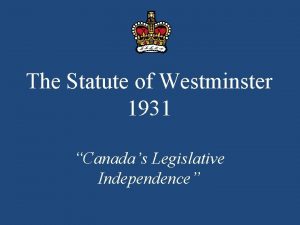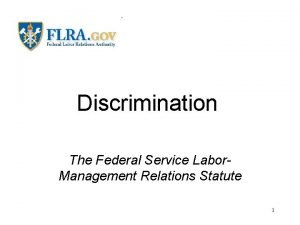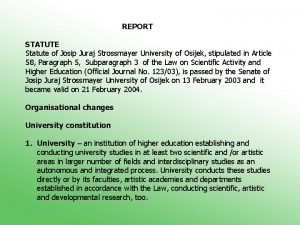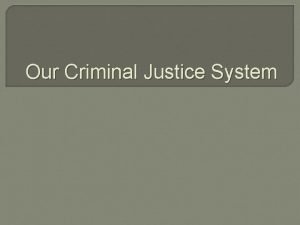Rome Statute of the International Criminal Court Act


















- Slides: 18

Rome Statute of the International Criminal Court Act Repeal Bill, 2016 BRIEFING TO THE PORTFOLIO COMMITTEE ON JUSTICE AND CORRECTIONAL SERVICES 31 January 2017

Introduction * RSA one of first signatories to Rome Statute of the International Criminal Court. * Rome Statute domesticated in RSA by means of the Implementation of the Rome Statute of the International Criminal Court Act, 2002. * Although International Criminal Court has important role to play in combatting international crimes and eliminating a culture of impunity, RSA wants to promote peace, stability, and good governance in Africa through the peaceful resolution of disputes.

Introduction cont. * Some of these disputes subject to investigation by the International Criminal Court (the ICC) and in respect of which heads of state, heads of Government and other officials of the countries concerned are subject to warrants of arrest issued by the ICC. * International Criminal Court Act requires RSA to arrest these persons and surrender them to ICC for prosecution which adversely affect initiatives by the RSA to promote peaceful resolution of disputes through negotiation.

Introduction cont. * RSA wants to give effect to international customary law, which recognises immunity of certain persons in order to effectively promote dialogue and the peaceful resolution of conflicts. * RSA adopted the Diplomatic Immunities and Privileges Act (DIPA) which confer immunity upon— diplomatic missions/members of such missions, ito the Vienna Convention on Diplomatic Relations, 1961, and consular posts/members of such posts, ito Vienna Convention on Consular Relations, 1963 (section 3)

- Introduction cont. heads of state/special envoys/ certain representatives (section 4); the UN ito Convention on the Privileges and Immunities of the United Nations, 1946/ specialised agencies and their officials ito Convention on the Privileges and Immunities of the Specialised Agencies, 1947/ organisations and their officials recognised by the Minister ito agreement entered into with organisation or conferred on them ito sec 7(2) of DIPA (section 5)

- Introduction cont. officials and experts of - UN/ any specialised agency/ representatives of any state, participating in an international conference or meeting convened in the RSA ito Convention on the Privileges and Immunities of the United Nations, 1946, or Convention on the Privileges and Immunities of the Specialised Agencies, 1947, or provided for in agreement, or conferred upon them ito sec 7(2) of DIPA (section 6)

Introduction cont. * The DIPA, also enacted the aforementioned Conventions into law in the RSA. * The International Criminal Court Act was adopted shortly after the DIPA, and in effect negates the immunities and privileges provided for in DIPA.

Judgment * In MINISTER OF JUSTICE AND CONSTITUTIONAL DEVELOPMENT V THE SOUTHERN AFRICAN LITIGATION CENTRE the Supreme Court of Appeal held that although customary international law recognises that heads of states and other high ranking office bearers enjoy immunity from arrest and prosecution or other interference while visiting a foreign state, RSA is bound in terms of it’s obligation in terms of the Rome Statute and the International Criminal Court Act, which remove such immunity.

Importance of immunity * It is important that states should be able to negotiate with each other freely and that persons charged with such activities should be able to perform their functions freely without harassment by other states. These immunities are necessary to ensure free dialogue to resolve conflicts and peaceful cooperation and co-existence among states, an aspect recognised by the ICJ * To ensure free dialogue and the resolving of conflicts, especially on the African continent and the mediation role of South Africa, such immunities should be reinstated.

Reinstatement of immunity * The repeal of the International Criminal Court Act and the withdrawal of South Africa from the Rome Statute will ensure that these immunities be reinstated. * Article 127 of the Rome Statute - a State Party may, by written notification addressed to the Secretary-General of the United Nations, withdraw from this Statute.

Reinstatement of immunity * Withdrawal shall take effect one year after the date of receipt of the notification, unless the notification specifies a later date * Instrument of withdrawal deposited with the UN Secretary-General on 19 October 2016. * 3 November 2016 - NA referred Declaratory Statement on decision to withdraw from Rome Statute to the Portfolio Committee on Justice and Correctional Services for consideration and to report thereon, and to the Portfolio Committee on International Relations and Cooperation for consideration

Provisions of Bill Clause 1 of Bill * Clause 1(1) of the Bill repeals the International Criminal Court Act * Clause 1(2), repeals section 13 of the South African Red Cross Society and Legal Protection of Certain Emblems Act, 2007 (Act No. 10 of 2007) * Clause 1(3) repeals section 20 of the Implementation of the Geneva Conventions Act, 2012

Provisions of Bill cont. Clause 2 of Bill * Clause 2 gives effect to Article 127(2) of the Rome Statute, and provides for a transitional clause to deal with cooperation with the ICC, in connection with criminal investigations and proceedings in relation to which the RSA had a duty to cooperate and which commenced prior to the date on which the withdrawal became effective. In terms of this clause such proceedings must be dealt with and concluded in terms of the provision of the International Criminal Court Act, as if the Act has not been repealed

Provisions of Bill cont. Clause 3 * Clause 3 provides for the short title and commencement. In terms of this clause the Bill will come into operation on a date fixed by the President by proclamation in the Gazette. The reason for this clause is to provide that the Bill will come into operation on an appropriate date after the formalities for withdrawal, as provided for in Article 127 of the Rome Statute, have been complied with.

Draft Bill to address international crimes * When Cabinet approved the introduction of the Bill into Parliament, concerns were raised about lack of domestic legislation criminalising international crimes (genocide, war crimes and crimes against humanity), which will result from the repeal of the International Criminal Court Act. * Draft Bill providing for the criminalisation of international crimes was submitted to the JCPS Cabinet Committee on 24 November 2016. JCPS Cabinet Committee recommended that Cabinet notes that the draft Bill is work in progress that Bill be deferred to 2017, which recommendation was accepted by Cabinet.

Draft Bill cont. Draft Bill is in the process of being finalised and aims to * criminalise international crimes under the domestic law of the Republic; * further regulate immunity in the Republic against prosecution for international crimes; * afford extra-territorial jurisdiction to South African courts to adjudicate international crimes; * provide for the investigation and prosecution of persons who commit international crimes;

Draft Bill cont. * ensure that persons who are accused of international crimes may be extradited to other States; * provide for the surrender of persons who are accused of international crimes to entities (which is defined as any international organisation, international tribunal, international court, or similar international body which has jurisdiction in respect of an international crime); * provide for co-operation between the Republic and entities in respect of persons who are accused of having committed international crimes;

Draft Bill cont. * effect various consequential amendments to other laws; and * further regulate immunity from prosecution for the crime of torture Thank you
 Is there a basketball court above the supreme court
Is there a basketball court above the supreme court Statute of westminster 1931
Statute of westminster 1931 My legs statute of frauds
My legs statute of frauds Federal service labor-management relations statute
Federal service labor-management relations statute What are statute laws
What are statute laws Difference between common law and statute law
Difference between common law and statute law Company statute
Company statute Florida board member certification course
Florida board member certification course Examples of statutes
Examples of statutes Alabama dui statute
Alabama dui statute Federal service labor management relations statute
Federal service labor management relations statute Statute of frauds my legs
Statute of frauds my legs Chapter 252 florida statutes
Chapter 252 florida statutes Estray statute
Estray statute Office of overseas schools
Office of overseas schools Macbeth act 3-5 summary
Macbeth act 3-5 summary Hát kết hợp bộ gõ cơ thể
Hát kết hợp bộ gõ cơ thể Slidetodoc
Slidetodoc Bổ thể
Bổ thể


































